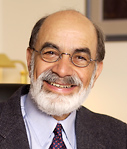Fawwaz Ulaby, known nationally and internationally for his accomplishments in applied electromagnetics, has been selected as the Henry Russel Lecturer for 2014 — one of the university’s highest honors for a senior member of its active faculty.
Ulaby is the Emmet Leith Distinguished University Professor of Electrical Engineering and Computer Science, Arthur F. Thurnau Professor and professor of electrical engineering and computer science, College of Engineering.
His selection as the Henry Russel Lecturer recognizes his work, which has included millimeter-wave circuits, remote sensing, computational electromagnetics, advanced electromagnetic materials for microwave applications and space plasma electro-dynamics.
In addition, three faculty researchers will receive the Henry Russel Award, one of the highest honors the university bestows upon junior faculty. They are:

Ulaby
• Dragan Huterer, associate professor of physics, LSA.
• Scott Lyons, associate professor of American culture, and English language and literature, LSA.
• Thomas Wenisch, Morris Wellman Faculty Development Assistant Professor of Computer Science and Engineering, assistant professor of electrical engineering and computer science, College of Engineering.
The honorees are selected for recommendation by the Russel Awards Faculty Advisory Committee, chaired by Janet Weiss, dean of the Rackham Graduate School.
The Henry Russel Lectureship is awarded each year to a U-M professor in recognition of exceptional achievements in research, scholarship or creative endeavors, and an outstanding record of teaching, mentoring and service. Ulaby will present the Russel Lecture in the spring of 2014.
Specific examples of Ulaby’s acclaimed research include numerous interdisciplinary projects aimed at the development of high-resolution satellite radar sensors for mapping Earth’s terrestrial environment, and the development of microelectronic devices and circuits that operate at wavelengths intermediate between the infrared and the microwave regions of the electromagnetic spectrum, according to the official Regents Communication submitted by President Mary Sue Coleman.
Ulaby joined the U-M faculty in 1984. He has published 15 books, most of them translated into Chinese, Korean, Portuguese and other languages, and more than 700 papers and other scientific publications. Similarly, his record of secured research funding testifies to the value of his research — more $6 million in this century alone. He is a fellow of the American Association for the Advancement of Science, a recipient of the Pecora Award from the U.S. Department of the Interior, the Arab Thought Foundation Award, and was named a Life Fellow by the Institute of Electrical and Electronics Engineers.
Huterer, who came to U-M in 2007, is a theoretical physicist working at the intersection of cosmology and elementary particle physics. His principal interest is in understanding the nature and origin of dark energy. He uses cosmological probes to study the properties of dark energy; these include measurements of distances to type Ia supernovae, mapping the growth and evolution of the large-scale structure in the universe, and gravitational lensing. During his time at U-M he has had more than 30 publications, with 4,000 citations.
He is a frequently invited speaker and already has written several review articles considered by his peers to be classics in the field. In his work as a phenomenologist, Huterer is developing new types of research that allow experimental data to be connected to the wealth of competing fundamental models. The prominence of his research at this early stage of his career is signaled by his selection as an Outstanding Junior Investigator by the U.S. Department of Energy in 2008.
Lyons, who came to U-M in 2011, presents through his research innovative and challenging perspectives on Native American literature and culture, global indigenous studies, colonial discourse and settler colonialism. Yet his interests range widely to related topics such as posthumanism, animal studies and the literature of discovery, encounter and conquest. His approach was crystalized in his book, “X-Marks: Native Signatures of Assent” (University of Minnesota Press, 2010), which was awarded the Beatrice Medicine Award for Scholarship in Native American Studies in 2011.
Lyons has been featured frequently as a keynote speaker at conferences, on television and on radio. His commitment to thinking and practicing an expansive pedagogy has been recognized by, among other honors and awards, a faculty fellowship at the Institute for the Humanities for 2013-2014, a Department of Education grant totaling more than $250,000, and a National Endowment for the Humanities Summer Seminar Scholarship.
Wenisch, who came to U-M in 2007, focuses his research on high-performance computer architecture, server and data-center energy efficiency, smartphone platforms, multiprocessor systems, and performance evaluation methodology. His record of publication includes nine papers from top-tier conferences, as well as more than a dozen other papers in other publications.
His research has attracted substantial external funding; in one year’s time he obtained two grants from the National Science Foundation and two grants from Google, notable achievements for faculty members at any level. During his six years at U-M he has received 12 grants. His research has been recognized with a CAREER Award from the National Science Foundation and in 2011 earned him a place in the International Symposium of Computer Architecture ISCA Hall of Fame.
The Russel Award and the Henry Russel Lectureship were established in 1925 with a bequest from Henry Russel of Detroit who received three degrees from U-M.

